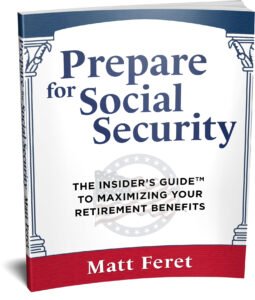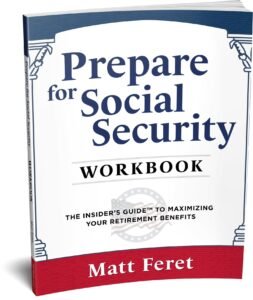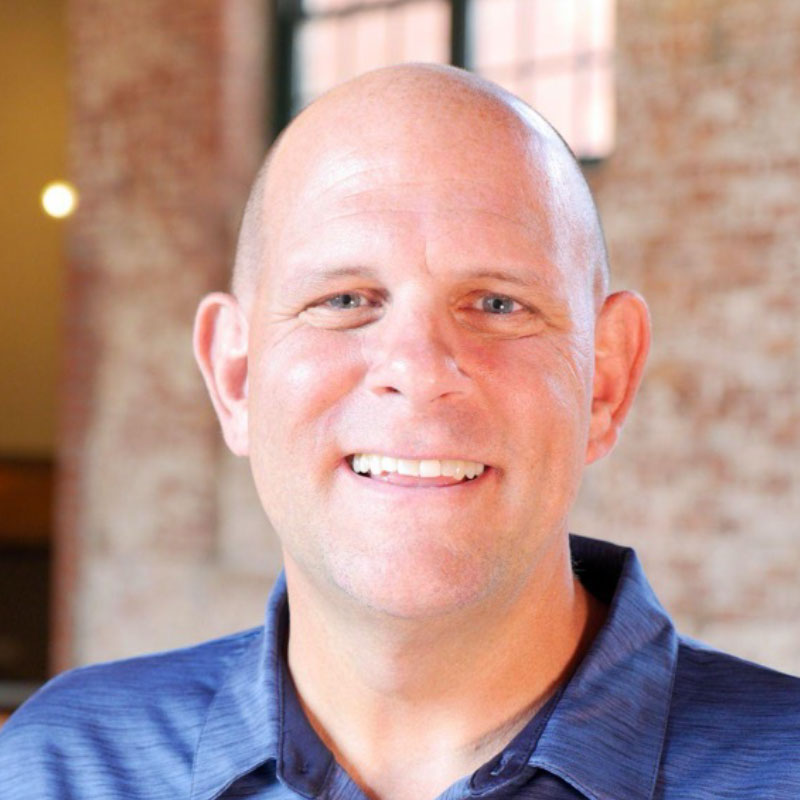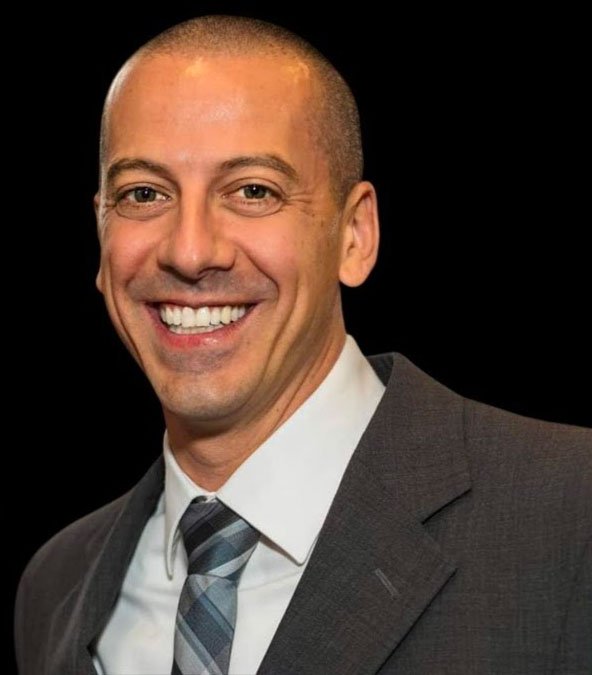#026
Share This:

“Please know there are no shortcuts or hacks when it comes to Social Security. There is no way of getting around the system, and it isn't wise to let someone else do all your decision making. You need to have some measure of knowledge, so you can make the wisest decision about Social Security because your future could quite literally depend on it.
However, there is no need to fear. Even though the system isn't simple, I'm here to simplify it. You'll learn the basics of Social Security, when to start claiming your benefits, how to avoid getting sucked into the Social Security marketing machine, whether to DIY or to get professional help, how to file, and much more.”
- Matt Feret, Author
This episode of The Matt Feret Show will give you an insider’s guide to my forthcoming book, Prepare for Social Security – The Insider’s Guide to Maximizing Your Retirement Benefits.
Enjoy a FREE preview of the Introduction section of the book, which also outlines the topics and goals of each chapter. Enjoy!
Listen to the episode on Apple Podcasts, Spotify, Deezer, Podcast Addict, Stitcher, Google Podcasts, Amazon Music, Alexa Flash Briefing, iHeart, Acast or on your favorite podcast platform. You can watch the interview on YouTube here.
Brought to you by Prepare for Medicare – The Insider’s Guide book series. Sign up for the Prepare for Medicare Newsletter, an exclusive subscription-only newsletter that delivers the inside scoop to help you stay up-to-date with your Medicare insurance coverage, highlight Medicare news you can use, and reminders for important dates throughout the year. When you sign up, you’ll immediately gain access to seven FREE Medicare checklists.
Quotes:
“There is no perfect age to start receiving our Social Security benefits. It is a highly individualized decision and there is no magic answer that will work for everyone. The solution is to not simply choose age 62 or 70.”
“I'll go so far as to say that if anyone answers the question, “when should you start drawing Social Security?” with simply an age, run.”
- Matt Feret, Author
“Let me emphasize what this book is not. Prepare for Social Security: The Insider's Guide is not a book that takes a curmudgeonly or negative approach to this long-running government program. Much of the literature on Social Security talks about it like it's a burden, rather than a blessing.”
“Is our current Social Security program perfect? Of course not, but it is absolutely a benefit, in that it provides a measure of financial stability for Americans in their retirement years. That is something to celebrate. So we will spend a lot of time in this book helping you navigate the system and taking a positive yet realistic approach.”
- Matt Feret, Author
#026
Selected Link from the Episode:
Full Show Transcript:
00:00:00 / 00:33:42
LEGAL CONDITIONS:
Matt Feret/MF Media, LLC owns the copyright all content and transcripts of The Matt Feret Show, and themattferetshow.com with all rights reserved, as well as right of publicity. All rights reserved.
No part of this publication may be reproduced or transmitted in any form or by any means, electronic or mechanical, including photocopying, recording, or by any information storage and retrieval system without written permission of the publisher, except for the inclusion of brief quotations in a review. You are welcome to share the below transcript (up to 500 words) in media articles, on your personal website, in a non-commercial article or blog post, and/or on a personal social media account for non-commercial purposes, if you include attribution to “The Matt Feret Show” and link back to the themattferetshow.com website.
WHAT IS NOT ALLOWED: No one may copy any portion of the content or use Matt Feret’s name, image or likeness for any commercial purpose or use, including without limitation inclusion in any books, e-books, book summaries or synopses, or on a commercial website or social media site (e.g., Facebook, Twitter, Instagram, etc.) that offers or promotes your or another’s products or services.
DISCLAIMER: This publication is in no way sponsored, associated, authorized, approved, endorsed nor, in any way affiliated with any government agency, company, trademarked names, or other marks. Any such mention is for purpose of reference only. Any advice, generalized statistics, or opinions expressed are strictly those of the host and the guest. This publication, The Matt Feret Show nor themattferetshow.com website is meant to replace the sage advice of healthcare, insurance, financial planning, accounting, or legal professionals. You are responsible for your financial decisions. It is your sole responsibility to independently evaluate the accuracy, correctness or completeness of the content, services, and products of, and associated with this publication. The thoughts and opinions expressed in this publication are those of the host and guest(s) only and are not the thoughts and opinions of any current or former employer of the host and guest(s) nor is this publication made by, on behalf of, or endorsed or approved by any current or former employer of the host and guest(s).
Matt Feret (00:02):
Hello, everyone. This is Matt Feret, author of the Prepare for Medicare book series. And welcome to another episode of The Matt Feret Show, where I interview insiders and experts to help light a path to a successful retirement.
(00:18):
Come say hello at https://themattferetshow.kinsta.cloud for show links, notes, websites referenced, quotable quotes, and the complete show transcript. You can also check out https://prepareformedicare.com, and my new site, https://prepareforsocialsecurity.com, both support the books Prepare for Medicare: The Insider's Guide to Buying Medicare Insurance and Prepare for Social Security: The Insider's Guide to Maximizing Your Retirement Benefits.
(00:49):
About that new book, Prepare for Social Security will be released in March 2023. The team behind the scenes are almost done and I thought what a great time to give a chapter away. Well, not an entire chapter, but the entire introduction, which sets up the 10 chapters in the book. So here it is. This episode of The Matt Feret Show will give you an insider's guide to my forthcoming book, Prepare for Social Security: The Insider's Guide to Maximizing Your Retirement Benefits. Enjoy.
(01:21):
Introduction
(01:23):
The vast majority of the decisions you make in life are not permanent. If you buy a house, you can always sell it and move. If you go into a certain career, you can always make an exit and train for another line of work. And if you get a tattoo, something that used to be seen as permanent, you can have it removed. However, there are a few decisions that are permanent, you get one shot, one chance to make a decision.
(01:49):
Deciding when to take Social Security and retirement is one of those do or die moments. You get one chance to claim it and one chance to make it right, except for the one-time withdrawal of benefits described later in the book. Making the wrong choice can cost you tens of thousands or even hundreds of thousands of dollars. Even worse, it could cost your heirs even more over their lifetime.
(02:13):
This all sounds harsh, but it's true. Even if you have a pension, insurance, or retirement accounts to supplement Social Security, it is still a significant chunk of income in your retirement years, that you or your spouse earned and are entitled to over your lifetime.
(02:31):
Like other government programs, Social Security often gets a bad rap. Does it provide everything you would like? Probably not. Is the system complicated to navigate? Yes. Is there lots of conflicting advice out there to confuse you even more? Of course. Even so, I'm here to help you navigate the complex and often befuddling world of Social Security. I also want to help you make the best decision possible, about when to apply for benefits and how to maximize them.
(03:00):
In a nutshell, the purpose of Social Security is to supplement the income you lose when you retire, or become disabled, or your dependent and survivors, if any, lose when you die. Except for disability, your monthly check near retirement or while retired is based on your 35 best years of earnings. While it's not 100% accurate, you can think of it as an insurance program or an annuity that provides income for the rest of your life.
(03:28):
Your Social Security payments rise with inflation, and unlike most investments, are protected from the rise and fall of fluctuations in the stock and bond markets. If you are married, your spouse will continue to receive a portion of your benefits even when you die. Your payments are guaranteed for life.
(03:48):
It is easy to take Social Security for granted but consider this. If you lived 100 years ago, there was no guaranteed income in your retirement years, except for what you might have saved or what your family could provide. When you look at it this way, you begin to realize there is a lot to love about Social Security.
(04:08):
As a retiree, the biggest danger you face is running out of savings because you can't accurately predict how long you will live. Social Security is designed to provide a predictable source of income regardless of how much you have or don't have in savings, investments, assets, or help from your family. That's the good news.
(04:29):
The bad news is that dealing with Social Security is a lot like buying a new computer, you're not a specialist. A lot of what you know you simply heard from other people, AM radio hosts and random people on YouTube and Facebook. I get it. A lot of what they've told you contradicts itself or just doesn't make much sense. You know it's important, but you're nervous about messing it up and just don't want to have to think about it.
(04:55):
When you ask an expert for advice, what they say is full of technical jargon you don't really care about. And often, you find out the person giving you advice only wants to sell you something. You aren't looking for a salesman, you're looking for someone who knows what they're talking about and genuinely wants to help you.
(05:13):
If that is true of a major purchase like a computer, it's even more true of your decision on Social Security. It's a once-in-a-lifetime decision that will affect your family's financial future for years to come, including your heirs.
(05:27):
The system is complicated and confusing to navigate. To give you one example, in the case of married couples, the formula for determining each person's benefit consists of 10 mathematical calculations. The Social Security Administration, SSA, personnel aren't much help either. They're overloaded and are not equipped to give you the best advice for your specific situation. Throughout the book, I will refer to the Social Security Administration as the SSA.
(05:56):
Unlike Medicare, you only get one shot at deciding when to start taking Social Security. And unlike Medicare, your choice affects your spouse and potentially your children and heirs. Some people wait until they're 70 years old to claim their Social Security benefits, but the majority of people take it early, at 62. Why?
(06:18):
Because most people believe Social Security is going to go bankrupt or that they will die before they can maximize their benefits. Therefore, they take it too early, potentially costing themselves and their heirs many thousands of dollars.
(06:32):
Prepare for Social Security: The Insider's Guide will give you an insider's view of how to best choose when to start drawing Social Security benefits and navigate a system that is not easy to understand. Please note that because it is such a vast topic, we are only focusing on Social Security for retirees and will not go in depth into Social Security for those on disability.
(06:57):
When it comes to reaping the benefits of all the years you have put into working, you don't want to make a critical mistake that can cost you a large chunk of your income. Remember, there is no magic answer to the question, when should I start claiming my Social Security benefits? The answer depends on a variety of factors.
(07:15):
But there is no need to go it alone. I'm here to help you save time, reduce your frustration, and give you peace of mind as you consider your options. I am thrilled to be your guide on this journey to making one of the most critical decisions of your life.
(07:31):
A quick note about terminology before we move forward. You've probably noticed I've used the term spouse a few times already. In this book, we will use the term spouse instead of partner, to ensure there's clarity. The SSA uses the term spouse to apply to legally married people. This applies to same sex or different sex couples. I will stick with the term spouse, since that's the language used by the SSA.
(07:56):
There are usually two types of Social Security recipients. Number one, people who like to do their own research and make the best decision. They want to know everything about the subject. They are skeptical of advisors and salespeople and like to DIY everything.
(08:12):
Number two, people who don't like the hassle of having to learn everything about a topic. They just want a knowledgeable expert to tell them what to do. They don't want to deal with Social Security. They want someone to make it easy, or secure the help of a qualified advisor or a consultant. No matter which category you fall into, this book is for you.
(08:33):
Please know there are no shortcuts or hacks when it comes to Social Security. There is no way of getting around the system, and it isn't wise to let someone else do all your decision making. You need to have some measure of knowledge, so you can make the wisest decision about Social Security because your future could quite literally depend on it.
(08:55):
However, there is no need to fear. Even though the system isn't simple, I'm here to simplify it. You'll learn the basics of Social Security, when to start claiming your benefits, how to avoid getting sucked into the Social Security marketing machine, whether to DIY or to get professional help, how to file, and much more.
(09:15):
If you read this book and follow my guidance, your total investment of time shouldn't be any more than a few hours. That's a tiny investment of time compared to the massive benefits you could see from making a wise, informed decision about Social Security. Once you're done, give this book to a friend.
(09:33):
One of the biggest challenges with Social Security, as with Medicare, the subject of my previous book, Prepare for Medicare: The Insider's Guide, is that you have many options. You not only have options in terms of when you start drawing your benefits, you also have options for whether to DIY or get help from a professional. This is both a curse and a blessing.
(09:55):
It is a curse because the sheer amount of information can be exhausting and overwhelming. Just search Social Security on Google, YouTube, or Amazon, and you will never reach the end of the information and books available. Information overload is real and can make you feel that you want to put your head in the sand and avoid making a decision altogether.
(10:14):
But options are also an advantage because everyone's situation is different. There is no perfect age to start receiving our Social Security benefits. It is a highly individualized decision and there is no magic answer that will work for everyone. The solution is to not simply choose age 62 or 70. I'll go so far as to say that if anyone answers the question, when should you start drawing Social Security, with simply an age, run.
(10:42):
So, when and what is the right decision for you and your household? It depends on a lot of factors, including your marital status, earnings history, age, whether or not you have children, and how old they are, whether or not you have a pension, and much, much more.
(10:59):
Therefore, in this book I will emphasize general strategies that apply to most people, specific strategies for various situations and case studies that illustrate these concepts. My goal is to help you cut through the noise and narrow down the options, so you can clearly see what's best for your individual situation.
(11:18):
Who Am I and Why Did I Write This Book?
(11:21):
As with my previous book, Prepare for Medicare: The Insider's Guide, I wrote Prepare for Social Security: The Insider's Guide to help you. I believe part of my purpose for being on Earth is to help people understand complicated things like healthcare, personal finance, and retirement issues.
(11:37):
When it comes to Medicare and Social Security, I bring a unique and holistic perspective as an expert in both topics. In my own life, I have pursued laughter and happiness with those I love. Helping people brings me joy. I want you to be able to do the same in yours as you head towards retirement and, hopefully, many blessed years afterward. I find more meaning in my life by using my knowledge to help those who need it most.
(12:01):
For the last couple of decades, I've spent my professional life as a Medicare insider. I share my experience with the world through books, podcasts, television and radio appearances, YouTube videos, online courses and partnerships.
(12:17):
Wealth management firms, insurance companies, agents, websites, financial advisors and tax professionals often give away free or very low-cost advice in hopes that you become a client of theirs or do something else that benefits them financially. There's never really a free lunch, is there?
(12:35):
They're not bad people. Some of my best friends are insurance agents and financial planners. It's just that I don't always share their perspective. I created my first book, as well as the one you're reading, to cut through the noise and share my objective advice and experience.
(12:51):
You can't sell Medicare, but Medicare insurance agents make healthy commissions selling Medicare insurance policies in and around Medicare. Helping people figure out original Medicare Parts A and B, Medicare Advantage, Medigap, and Medicare Part D prescription drug plans is helpful to a lot of people.
(13:09):
But what's behind that is an entire Medicare insurance ecosystem that sells people insurance policies and financial planning products. In essence, most of the free Medicare education, YouTube videos, and websites out there are designed to lead you into buying an insurance policy.
(13:26):
Similarly, you can't sell Social Security, but financial planners, wealth managers, insurance agents, accountants and annuity salespeople can certainly make commissions selling products and insurance policies around Social Security education.
(13:42):
Over the last 20 years, I've trained thousands of Medicare agents in live classrooms. I explain all the hoops Medicare agents have to jump through initially and annually to sell Medicare insurance products in Prepare for Medicare: The Insider's Guide. I'll refer you to that book for a detailed summary.
(14:00):
Medicare certifications don't include much, if anything about Social Security. I wondered why not? In my experience, Medicare insurance agents and agencies are not usually Social Security experts and none of the Medicare insurance companies do training on it. In addition, none of the annual certifications that agents have to take for Medicare contain much, if any, Social Security training at all.
(14:26):
All the Medicare insurance agents I know basically understand that, A, you can have Medicare deduct any monthly premium you owe for Medicare Part D or a Medicare Advantage Plan out of your Social Security check. And B, people have to decide when they're going to start getting their Social Security benefits.
(14:44):
Yet, there is a lot of interactions between Social Security and Medicare. We have an entire chapter devoted to the relationship between these two government programs, so you'll hear much more about this later.
(14:57):
In fact, a great Medicare agent should know a lot about Social Security, but they probably don't. Likewise, some financial advisors can tell you about Social Security, but they're not great at Medicare. There is a knowledge gap among lots of advisors and agents who help people plan for retirement. This is a gap I'm excited to fill with this book.
(15:20):
When I decided to write this book, I wasn't a Social Security insider. I knew about as much as most Medicare insurance agents do, which is not enough. So I had to do a lot of research. I was an outsider. I ordered and read all the other books on Social Security and spent untold hours of research on the subject.
(15:38):
To top it off, I even investigated not one but two professional Social Security certification programs offered to financial advisors and insurance professionals. The National Social Security Advisor certification has been called the gold standard in Social Security training and education and has been awarded to only 2,500 people across the country. I also researched the National Association of Registered Social Security Analysts online training program.
(16:08):
Between my independent research and these two certification courses meant for financial planners, wealth managers, annuity salespeople, and insurance agents, what I found was very interesting. These programs do a good job of explaining Social Security and how to help people create strategies and personalize decisions around electing Social Security.
(16:27):
Even beyond that, there are marketing materials and instructional how-tos for financial planners, agents, annuity salespeople, life insurance, lawyers and estate planners who use Social Security as a sales lead funnel. Plus, they're pretty upfront about that. Their intentions are basically hiding in plain sight, help clients with Social Security planning and pivot them into products that generate commissions or fees.
(16:54):
This is not necessarily a bad thing. For example, the Gap uses 99 cent flip-flops to lure you into the store. In business terms, it's called a loss-leader. There's no way the Gap makes any money on 99 cent flip-flops. They probably lose money when you buy the 99 cent flip-flops, but they don't care because it gets you into the store, where they can sell you the jeans and shirts that do make them money.
(17:18):
In the same way, lots of experts use Social Security information as a way to get you into their sales funnel to buy all kinds of insurance, annuities, IRA rollovers and other products and services.
(17:30):
There is no shortage of financial gurus offering advice and products you might find useful. I have an entire chapter dedicated to helping you find a competent and reputable advisor. This book will help you know what questions to ask and understand the answers that are given.
(17:47):
Throughout the book, I will will cite many outside sources. You can head over to www.prepareforsocialsecurity.com/sources to view the links to those sources. I've also included a glossary of common Social Security terms and acronyms at the end of the book.
(18:05):
For additional information or more in-depth discussion, you can find that on the website as well. I encourage you to only use the links I provide at prepareforsocialsecurity.com and not click out of them, or you'll end up going down the very same rabbit hole you've no doubt already found yourself in, reading lots of random blog posts on the internet.
(18:27):
This is also a great time to mention the other helpful resources you'll find on my website. When you visit, you can find your local Social Security office, including driving directions and phone numbers. In addition, I also offer Social Security consulting and a Prepare for Social Security course that will visually walk you through all the elements of the book, including how to determine when to file for Social Security and how to file. Don't miss these amazing resources.
(18:54):
Making the System Work for You
(18:57):
Let's be honest, most people feel confused and frustrated by all the details that go into making a decision about when to apply for Social Security benefits, but there is no need for it to be this hard. As we journey together through this complicated maze called Social Security, I will be your personal tour guide. I will filter out the noise and share with you only what you need to know. I don't have any interest in stuffing your head full of knowledge, just to increase the page count of the book. My sole purpose is to help you feel comfortable and confident navigating Social Security, so you can make wise decisions.
(19:33):
This book will show you how to do three things. Number one, how to decide when to apply for Social Security benefits. Number two, how to actually enroll. Number three, how to confidently DIY or find an advisor to help you navigate the maze.
(19:52):
Albert Einstein allegedly said, "You do not really understand something unless you can explain it to your grandmother." That's quite literally what I'm going to do, explain Social Security in clear terms that anyone can understand, without having to go back to college. It's not going to be too technical, but at the same time, it's not going to be so basic and simple that you could easily find the same material online. I'll do the hard work of sorting through some pretty complex issues and cut through quickly to the bottom line you need to know.
(20:23):
A Quick Tour of Prepare for Social Security
(20:26):
To help you get the most out of this book, let me share a quick summary of each chapter, so you can quickly find what you need.
(20:33):
Chapter 1: What is Social Security?
(20:36):
This chapter will give you the big picture of Social Security. We will review what Social Security is, how and why it was created, and why you need it. We will also summarize Social Security benefits, such as retirement, disability and income for dependents and survivors. You'll learn how benefits are calculated, how credits work, and why you shouldn't believe many of the common myths that have circulated about Social Security for years.
(21:01):
Early in their careers, a lot of people assume Social Security won't be there by the time they retire, or that if it is, it will pay out so little you'll be lucky to buy a loaf of bread with your monthly check. Wrong on both counts. Or they file early because they don't want to pass away before they get back what they put in over the course of their working life.
(21:21):
Don't believe the hype, Social Security is one of the most firmly established programs the United States government offers. For most people, even if it is not enough by itself to do all the things you'd like to do in retirement, it will provide a substantial chunk of change that you'll be grateful for to cover significant monthly expenses.
(21:42):
Chapter 2: Deciding When to Claim Your Social Security Benefits
(21:46):
This chapter gets into more specific details that are essential for you to understand. How do you enroll in Social Security? What's the best age to start drawing benefits? You'll find plenty of age-related advice out there that is overly simplistic. We have to remember that everyone's situation is different.
(22:02):
And if it's a choice between drawing Social Security versus cashing out more of your other investments to make ends meet, you might be better off retiring earlier. But generally speaking, the best advice is to wait until age 70. Strictly from the standpoint of maximizing your money, there is no debate. If that's the case, then why do the vast majority of people start drawing Social Security early, at age 62?
(22:26):
Many fear that if they die early, they won't get to enjoy as much of their benefits and maybe even know people who died without getting anything. Others falsely assume the program may run out of money before they reach age 70. If you feel that way, we'll look at the evidence and see if we can change your mind.
(22:44):
We'll also look at the most advantageous way to manage Social Security, not only for your own benefits, but for your spouse and dependents. Unlike Medicare, with Social Security, you have one time choices to make that will impact your spouse and potentially your children.
(23:01):
Why should an individual or married couple take early, full, or late Social Security retirement benefits? What are the pros and cons? What are the common mistakes and misperceptions to avoid? What are some optimal strategies to consider? What if you are retiring before 65, retiring at 65, or working past 65, how should your strategy be modified if you're married or single, healthy or ill, and with or without dependents?
(23:30):
Many people don't realize that their spouse can receive a benefit of up to half of that of the primary Social Security insurance account holder. What if your spouse passes away? You can start taking survivors benefits as early as age 60, and can receive up to 75% of your deceased spouse's benefit. It's important to bear these facts in mind, so you don't leave money on the table that belongs to you.
(23:55):
Chapter 3: Social Security Election Case Studies
(23:59):
In this chapter, we will bring it all home with case studies to illustrate different life situations. We will review the most common optimal strategies and provide case studies that can help you understand how the system works better, by comparing you with someone in a similar situation. Those examples will also let you compare outcomes of drawing benefits at different ages, 62, 65, 67 or 70.
(24:24):
I've also put together a helpful checklist to guide you through making the best decisions related to your Social Security benefits. In addition, I'll provide you with a bibliography of good online and print sources, if you want to go into more detail than we can do in a brief book, but I will get you off to a good start.
(24:43):
Chapter 4: The Frustrating Flaws of Social Security
(24:48):
I will point out some of the frustrating flaws of Social Security that prevent it from living up to all its potential. I'll also suggest ways to supplement Social Security to prevent those flaws from interfering with your post-retirement plans. Many people are unaware that Social Security benefits are taxed as income by the federal government and in some state governments. This is an important consideration in making your retirement plans.
(25:14):
Chapter 5: The Social Security Marketing Machine and What It Means for You
(25:19):
You could also call this chapter consumer beware. I want to help you understand the motivations and the machinery behind the marketing and free information related to Social Security. Many organizations, salespeople and websites are trying to sell you access to fancy online calculators, free lunch and learn seminars and other free information to develop a relationship.
(25:42):
You will often hear about the Social Security is a fixed rate annuity concept. Therefore, advisors, annuity salespeople and insurance agents could potentially guide you to maximize or hasten your benefits. This frees up money for annuities, stocks and bonds, and expensive insurance products.
(25:59):
Chapter 6: Understanding How Social Security and Medicare Work Together
(26:05):
What are the issues related to managing Medicare and Social Security together? You'll want to know that if you elect Social Security at a certain time, Medicare automatically enrolls you. Otherwise, if you defer Social Security, you will need to sign up for Medicare manually.
(26:21):
So what's the best strategy for how and when to sign up for Social Security and Medicare? Most people elect to have their Medicare Part D or Medicare Advantage premiums automatically deducted from their Social Security checks, which sounds convenient, until you realize that Social Security sometimes takes months to catch up to Medicare, and then takes payments out all at once.
(26:42):
In the meantime, the Medicare insurance company may ask for a manual payment from you, leading to a double payment when Social Security finally deducts the payment. It's a mess, I know. But this is just one of the many ways things don't always work out in real life the way they're supposed to on paper, so we need to plan for them.
(27:00):
Chapter 7: Filing for Social Security Benefits DIY, or Do It Yourself
(27:06):
If you want to take the DIY approach, this book will help you get started. I'll identify reputable sources of information and online calculators that will help you make wise and prudent decisions. Then, I'll guide you through how to set up everything you need using the ssa.gov website in person or over the phone.
(27:26):
Chapter 8: Filing for Social Security Benefits: Hire a Consultant or Advisor
(27:33):
For those who decide to hire a consultant or financial planner, this book will give you a basic familiarity with the ins and outs of Social Security, so you can ask the right questions and understand the answers you receive.
(27:45):
A whole multimillion-dollar industry has grown up just around helping people figure out Social Security. There are two types of Social Security experts. With the first one, you'll pay a fee for a comprehensive report and custom tailored recommendations. With the second one, you can receive advice from an expert who doesn't charge a consulting fee.
(28:07):
However, you'll find that free advice is not always as free as it might appear. Frankly, most people offering to help you with this issue for free are interested in upselling you into something else, an insurance policy, a retirement plan, a webinar, or any other number of expensive products.
(28:23):
Unfortunately, there are also those who take advantage of the anxieties of vulnerable people to take unfair advantage for their own profit. I'll show you how to avoid those people and find the best expert for you and your family. I'll offer you some advice on how to spot a scam and what to look for in a legitimate retirement advisor.
(28:43):
What makes a person in this field an expert? How do you identify them? Do they have to have any professional designations? How important is it that your advisor also be well-informed about Medicare? It all sounds overwhelming, but I'll show you how to make the most out of free services, without getting sucked into buying something else.
(29:04):
Chapter 9: Bringing It All Together and Formulating Your Plan
(29:09):
In this chapter, we will bring everything you have learned together, so you can start to develop your plan to get the most out of Social Security. We will compare and contrast the DIY and advisor consultant approaches.
(29:22):
You'll also learn whether to use the breakeven strategy, which is a common, yet controversial approach. There are many, many factors to consider when formulating your Social Security approach and I want you to make an informed, wise decision.
(29:36):
Chapter 10: Special Situations: Veterans, Disability, and More
(29:42):
We'll also look at some other special situations that may apply to you, and explain in plain English how you can research and understand how the rules of Social Security apply in those circumstances. For example, what are the rights of surviving spouses or divorced spouses? What about military veterans? What about clients who live abroad? We'll consider all these and more.
(30:04):
Let's get started. Before we begin chapter one, let me emphasize what this book is not. Prepare for Social Security: The Insider's Guide is not a book that takes a curmudgeony or negative approach to this long-running government program. Much of the literature on Social Security talks about it like it's a burden, rather than a blessing.
(30:25):
Is our current Social Security program perfect? Of course not, but it is absolutely a benefit, in that it provides a measure of financial stability for Americans in their retirement years. That is something to celebrate. So we will spend a lot of time in this book helping you navigate the system and taking a positive yet realistic approach.
(30:46):
I also want to emphasize that this book does not cover every single conceivable situation related to Social Security. We will not dive into issues and details related to disability benefits, benefits for children, or other niche topics. This book is primarily geared towards retirees.
(31:03):
I started this introduction off by suggesting that the process of making decisions about Social Security is a lot like buying a computer. A lot of people feel overwhelmed by this kind of decision, want to avoid it, and honestly just wish there was someone they could trust who could help them decide what to do. You are fortunate if you have a close relative who loves technology.
(31:23):
Unfortunately, few of us have family members with the level of expertise in Social Security to help us out the way we need. The Social Security Administration itself is understaffed and struggling with outdated technology, so even they are not always able to give you the accurate information you need.
(31:41):
But knowledge is power. I want to put the knowledge and the power in your hands, where it belongs. Knowledge accumulates as you use it. Just like you start using a computer, figuring out how things work and how to make it work for you, my hope is that I can help you become increasingly confident in your knowledge of the Social Security system, so that it will also work for you. And I hope that after it's sorted out, your Social Security, like your new computer, will help you accomplish the work, family connection, and play that will make your years rich and rewarding.
(32:15):
Thank you for reading and listening. Now, let's get started. To your wealth, wisdom, and wellness.
(32:25):
The Matt Feret Show, related content, the publications and MF Media LLC is in no way associated, endorsed, or authorized by any governmental agency, including the Social Security Administration, the Department of Health and Human Services, or the Centers for Medicare and Medicaid Services.
(32:42):
The Matt Feret Show is in no way associated with, authorized, approved, endorsed, nor in any way affiliated with any company, trademark names, or other marks mentioned or referenced in or on The Matt Feret Show. Any such mention is for purpose of reference only.
(32:57):
Any advice, generalized statistics, or opinions expressed are strictly those of the host and guests of The Matt Feret Show. Although every effort has been made to ensure the contents of The Matt Feret Show and related content are correct and complete, flaws and regulations change quickly and often.
(33:14):
The ideas and opinions expressed on The Matt Feret Show aren't meant to replace the sage advice of healthcare, insurance, financial planning, accounting, or legal professionals. You are responsible for your financial decisions. It is your sole responsibility to independently evaluate the accuracy, correctness, or completeness of the content, services, and products of and associated with The Matt Feret Show, MF Media LLC, and any related content or publications.
(33:42):
The thoughts and opinions expressed on The Matt Feret Show are those of the host and The Matt Feret Show guests only, and are not the thoughts and opinions of any current or former employer of the host or guests of The Matt Feret Show, nor is The Matt Feret Show made by, on behalf of, or endorsed, or approved by any current or former employer of the host or guests of The Matt Feret Show.













